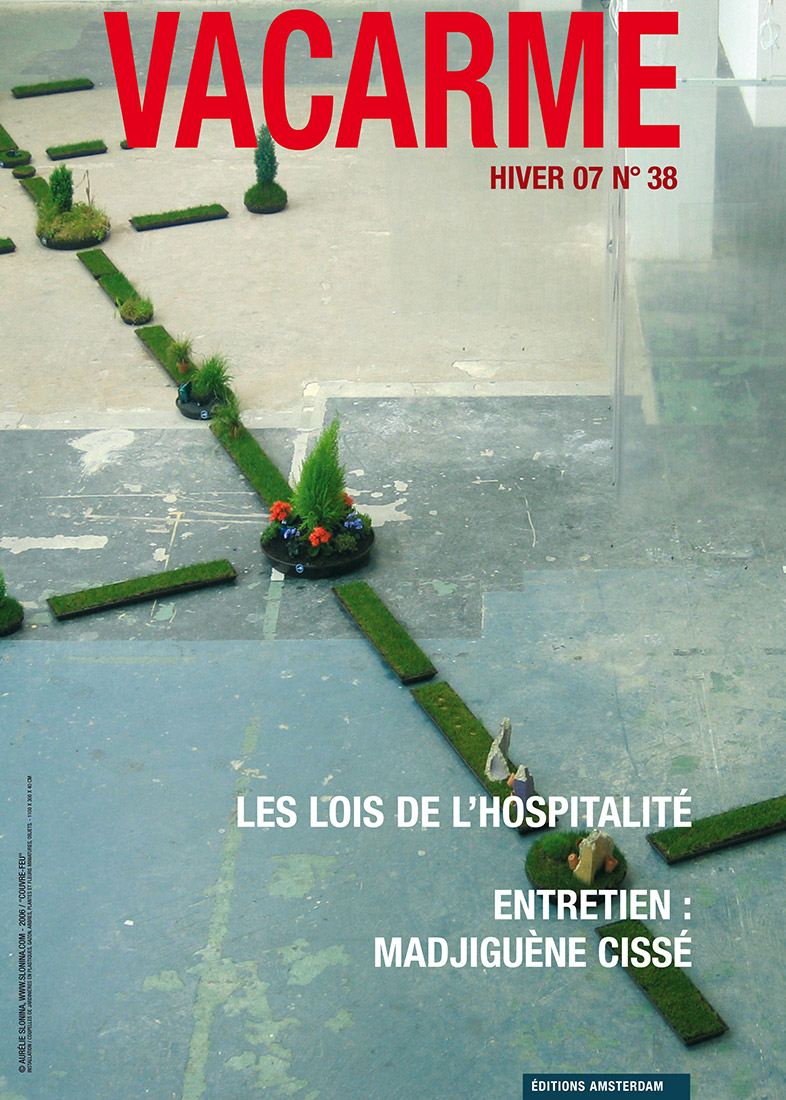Vacarme 38
hiver 2007

À nos lectrices et lecteurs
Ce numéro, Vacarme 38 (hiver 2007), est désormais archivé et tous ses articles sont accessibles dans leur intégralité. Vacarme aime la gratuité, mais une revue existe grâce à ces abonné·es.
Chantier
les lois de l’hospitalité
avant-propos
par Mathieu Potte-Bonneville
Que l’hospitalité s’invite dans le débat politique paraît ressortir, selon les points de vue, de l’évidence ou de la confusion. Évidence : le sentiment de scandale qu’inspire le sort aujourd’hui fait aux étrangers fait de l’exigence d’accueil l’un des vecteurs de politisation majeurs de notre temps, l’un des seuls à déverrouiller régulièrement la barrière qui sépare le public de l’intime. Depuis la pétition initiée, en 1997, par des cinéastes affichant contre les lois Debré leur résolution (…) Lire →
les joies de l’hospitalité
par Pierre Zaoui
une politique entre morale et anthropologie Lire →
besoin des autres
par Joseph Confavreux, Aude Lalande, Philippe Mangeot & Pierre Zaoui
table ronde avec les anthropologues Elisabeth Allès, Alban Bensa, Aïssatou Mbodj-Pouye et Sandrine Ruhlmann Lire →
Nanling, sud de la Chine
par Sylvie Blocher
video stills Lire →
une pierre dans le jardin : ce que les NIMBYs nous apprennent de l’hospitalité
par Stany Grelet
sur l’(in)hospitalité urbaine. Lire →
la préférence communale
par Christophe Daadouch
les limites de l’hospitalité communale Lire →
juste un air d’accueil
par Jérôme Huguet
des lieux pour les « gens du voyage » ? Lire →
changement d’adresse
par Oscar Tango
les jeux de l’hospitalité
par Vincent Casanova
Autremonde : portrait d’une association Lire →
le mot de passe
par Ariane Chottin-Burger
nouer des liens dans la langue de l’autre Lire →
l’hôtesse
par Xavier de La Porte
le sourire de la télévision Lire →
preface
by Mathieu Potte-Bonneville
That the principle of hospitality should find its way into current political discourse would seem to stem— depending on one’s point of view— from facts or confusion. A fact: the sense of outrage aroused by the treatment immigrants receive today has turned the demands of hospitality into one of the major politicising forces of our time, one of the only ones to regularly unlock the barrier separating what is public from what is personal. From the time of the 1997 petition raised by a group of (…) Lire →
the joys of hospitality
by Pierre Zaoui
Traditionally, hospitality seems to be caught between the upright pole of duty and the weight of a constraint: by imposing his presence, the stranger seems to embody an obligation which is more ancient than politics, and which thus acts to restrict both the scope of politics and the joys it can provide. A politics detached from this transcendent perspective cannot simply bury the obligation of hospitality under orgies of sharing: we must re-examine the experience of the welcome, identify (…) Lire →
a stone in the backyard: what NIMBYs have to teach us about hospitality
by Stany Grelet
Is a politics of hospitality possible? I believe so, if the relationship to the home is clearly defined, even if this means dismantling the belief that our home is our castle. In this context, the analysis of NIMBY movements and reactions to them provide an excellent starting point. What do we hope to achieve by opposing local residents who refuse point blank to live alongside undesirable social groups?
Let me begin with two personal examples. In March 1998, I began sharing a flat with (…)
Lire →
the hospitality game
by Vincent Casanova
Why set rules, or even limits, on hospitality when one has undertaken the mission of offering it to the most destitute people? Maybe because hospitality remains under the threat of a double-edged Sword of Damocles. Beforehand, if overly strict preliminary conditions for welcoming others are set, the principle dissolves. Afterwards, if every kind of behaviour is tolerated from those welcomed, it dilutes the whole practice. So how might an internalisation of the rules be achieved, instead of (…) Lire →
the password
by Ariane Chottin-Burger
Extending hospitality means putting prejudices and expectations to one side to welcome the Other. This article describes the outcome of a gamble — inviting young people studying languages or excluded from the school system to take part in “conversations”. Switching from one language to another means first of all looking for things that can engage the Other in discourse, transform meanings and make them transferable, from which point commonality can come into being. Some key moments from a (…) Lire →